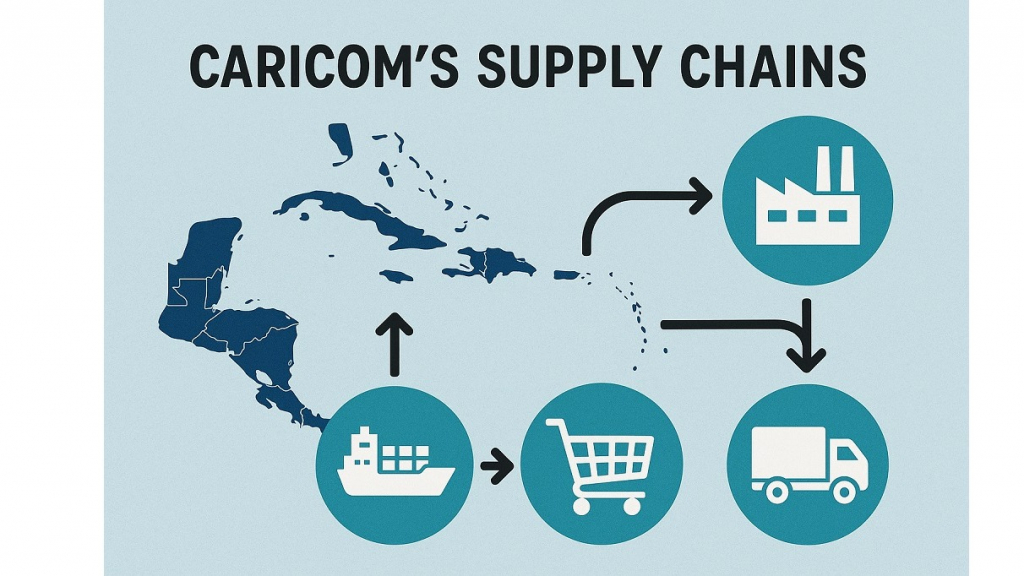A New Era of Trust in Caribbean Trade
Supply chain transparency is no longer a luxury—it's a necessity. In today’s global marketplace, buyers demand traceability, authenticity, and ethical sourcing. For CARICOM nations striving to elevate intra-regional and global trade, blockchain technology is emerging as a revolutionary solution.
This article explores how blockchain is transforming CARICOM’s supply chains—enhancing traceability, trust, and trade opportunities across the region.
What is Blockchain and Why It Matters for Trade
At its core, blockchain is a decentralized, immutable ledger that records transactions across a network of computers. Each record is time-stamped and linked to the previous one, forming a secure "chain” of data.
For supply chains, this means:
-
Real-time tracking of goods from origin to delivery
-
Tamper-proof records that reduce fraud and counterfeiting
-
Automated contracts (smart contracts) that trigger payments, inspections, or alerts
In a trade environment often challenged by paperwork delays, manual tracking, and limited transparency, blockchain brings a new level of efficiency and integrity.
Use Case: Exporting Agricultural Produce from Guyana
Guyana has an export surplus of rice, sugar, and seafood. By implementing blockchain traceability systems, exporters can log every stage of the supply chain—from farm to port.
This benefits:
-
Importing CARICOM nations like Barbados and Saint Lucia, which rely on Guyana’s staples
-
Retailers and consumers, who gain confidence in the origin and quality of the product
-
Exporters, who can command higher prices and ensure compliance with regional standards
Imagine a Barbados importer scanning a QR code to verify that the rice shipment met sanitary and phytosanitary (SPS) standards at every checkpoint. That’s the power of blockchain.
Blockchain Adoption in Jamaica’s Logistics Sector
Jamaica, with its vibrant port economy and transshipment hubs, is exploring blockchain for customs clearance and container tracking. The Port Authority of Jamaica has piloted blockchain-based cargo verification, cutting down clearance time and fraud.
Key advantages:
-
Reduced bottlenecks at ports like Kingston and Montego Bay
-
Integration with digital invoices and certificates of origin
-
Real-time updates for buyers in CARICOM and beyond
This makes Jamaica not just an exporter but a tech-driven trade facilitator.
How Trinidad & Tobago Uses Blockchain to Track Petroleum Exports
As a major exporter of petrochemicals and LNG, Trinidad & Tobago has begun integrating blockchain to track high-value shipments. Given the risks of tampering, leakage, or misreporting, the technology is ensuring:
-
Secure documentation
-
Real-time tanker tracking
-
Compliance with environmental and trade regulations
This also improves trade with countries like Barbados, Suriname, and the Dominican Republic, which import energy from Trinidad.
Building Interoperable Systems Across CARICOM
The key to successful blockchain adoption is interoperability—ensuring that different CARICOM countries’ systems can "talk” to each other.
To support this, the CARICOM Secretariat and the Caribbean Telecommunications Union (CTU) are encouraging:
-
Common data formats
-
Mutual blockchain governance standards
-
Pilot programs among customs departments
Digital integration will allow a shipment logged in Saint Vincent to be automatically recognized by customs in Antigua or Grenada without manual re-entry.
Challenges to Blockchain Adoption in the Caribbean
While the potential is huge, a few hurdles remain:
-
Digital literacy gaps among SMEs
-
High cost of blockchain infrastructure for smaller economies
-
Regulatory uncertainty about data sovereignty and crypto payments
-
Resistance to change from manual or legacy systems
To address this, CARICOM states can pursue joint training, seek funding from development partners like the IDB or World Bank, and form regional innovation hubs for shared infrastructure.
Opportunities for Blockchain Startups in the Region
The rise of blockchain opens the door for homegrown Caribbean tech startups to thrive. Opportunities include:
-
Developing traceability apps for agriculture, seafood, and artisan crafts
-
Creating digital wallets for secure B2B transactions
-
Smart contract templates for cross-border payments
-
Compliance tools for export documentation
Countries like Saint Kitts and Nevis, with favorable digital finance laws, are positioning themselves as blockchain incubators in the region.
Consumer Benefits and Ethical Trade
Consumers today care about:
-
Origin
-
Sustainability
-
Labor practices
Blockchain empowers ethical trade by recording every step—from fishing licenses in Dominica to organic farming certifications in Saint Lucia—on a permanent ledger. It also gives buyers in Suriname or Belize confidence in what they’re purchasing, boosting intra-regional loyalty.
A Look at the Future: Blockchain + AI for Predictive Trade
What’s next? The fusion of blockchain with AI and IoT (Internet of Things) will:
-
Predict shipping delays
-
Automate insurance claims
-
Monitor refrigeration levels for perishables in real time
For CARICOM, this means smarter, more responsive trade networks.
Conclusion: Trust, Verified
Blockchain isn’t just about technology—it’s about trust. For the 15 member states of CARICOM, investing in blockchain-enabled supply chains can reduce trade friction, build buyer confidence, and open doors to new markets.
By embracing transparency today, the region secures its trade future tomorrow.




Share this via
Or copy link